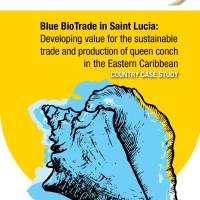
The queen conch (Strombus gigas) is a highly appreciated seafood delicacy with important non-food uses, including therapeutical products and handicrafts. While global demand is booming, small-scale coastal producers in the Eastern Caribbean do not fully seize the opportunities offered by sustainable conch markets. In 2020, the United Nations Conference on Trade and Development (UNCTAD), the Organisation of Eastern Caribbean States (OECS) – with the support of the European Union and the Convention on International Trade in Endangered Species of Wild Fauna and Flora (CITES) – joined forces to design a pilot project to test the application of the revised UNCTAD BioTrade1 Principles and Criteria (UNCTAD, 2020)2 to the marine environment, focusing on the queen conch value chain in the countries of Grenada, Saint Lucia, and Saint Vincent and the Grenadines. This case study presents the value chain analysis of queen conch production in Saint Lucia. It builds on a stakeholder map of the queen conch value chain of Saint Lucia, Grenada, and Saint Vincent and the Grenadines, produced as part of the Blue BioTrade project.3 It is the first of three country case studies to be produced under the Blue BioTrade Project, together with forthcoming studies of queen conch production in Grenada and Saint Vincent and the Grenadines. These case studies, in addition to a regional workshop, will contribute towards the development of a regional Blue BioTrade Action Plan in 2022. This report is divided into eight chapters. Chapter I provides an introduction and overview of the approach taken by the case study. Chapter II analyses the regulatory frameworks, management plans and institutional frameworks in Saint Lucia as they relate to the queen conch. Chapter III provides a product assessment, looking at Saint Lucian queen conch biology and stock location. Chapter IV analyses the value chain, examining its economic features during the pre-harvest, harvest and post-harvest stages. Chapter V presents an initial assessment of current market access and potential entry points to various potential markets of queen conch products. Chapter VI outlines the main challenges faced by the value chain. It is followed by chapter VII, which outlines opportunities to address these challenges using the BioTrade Principles and Criteria as a guideline. Finally, the report ends by providing recommendations and conclusions in chapter VIII.
